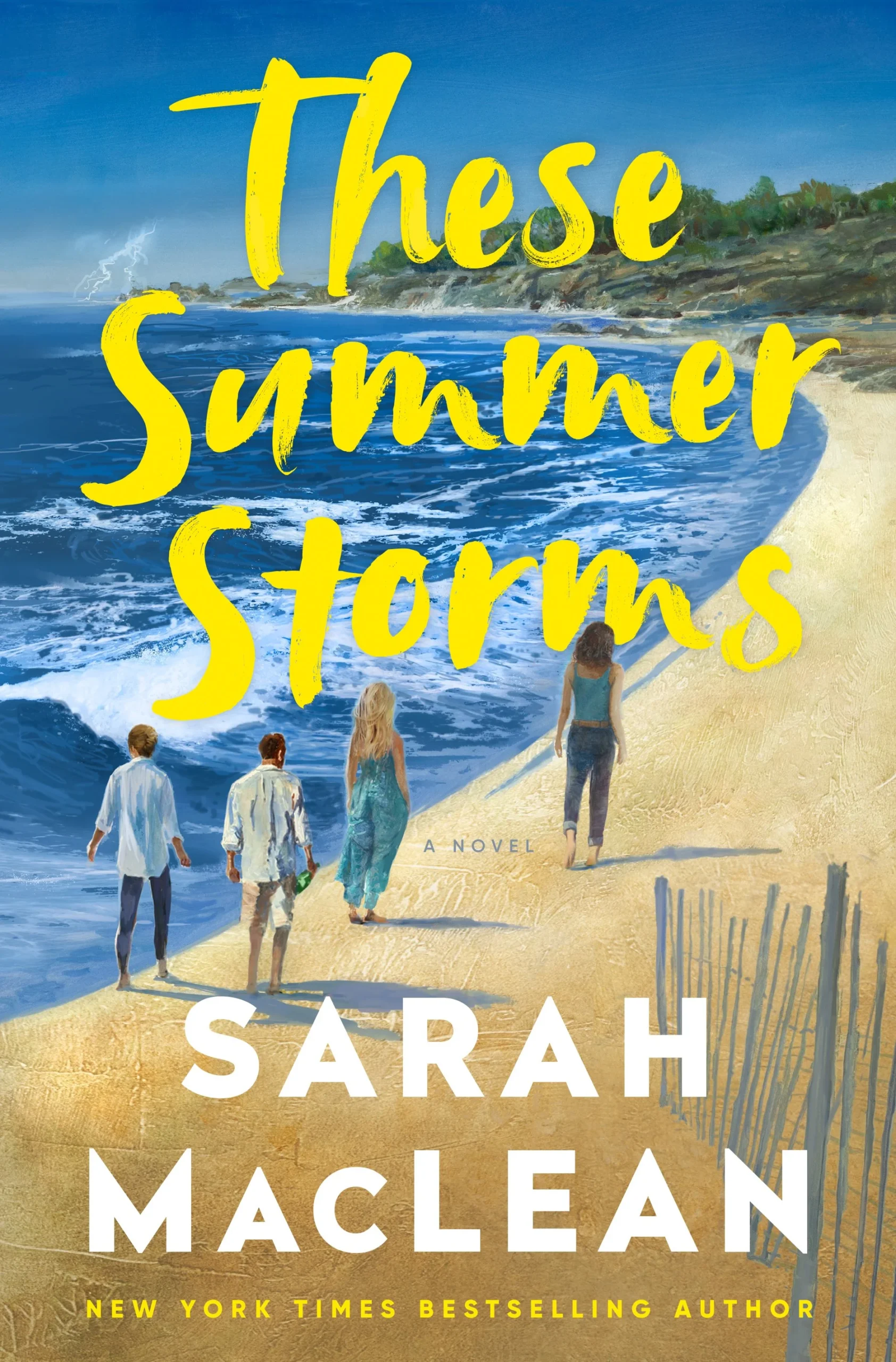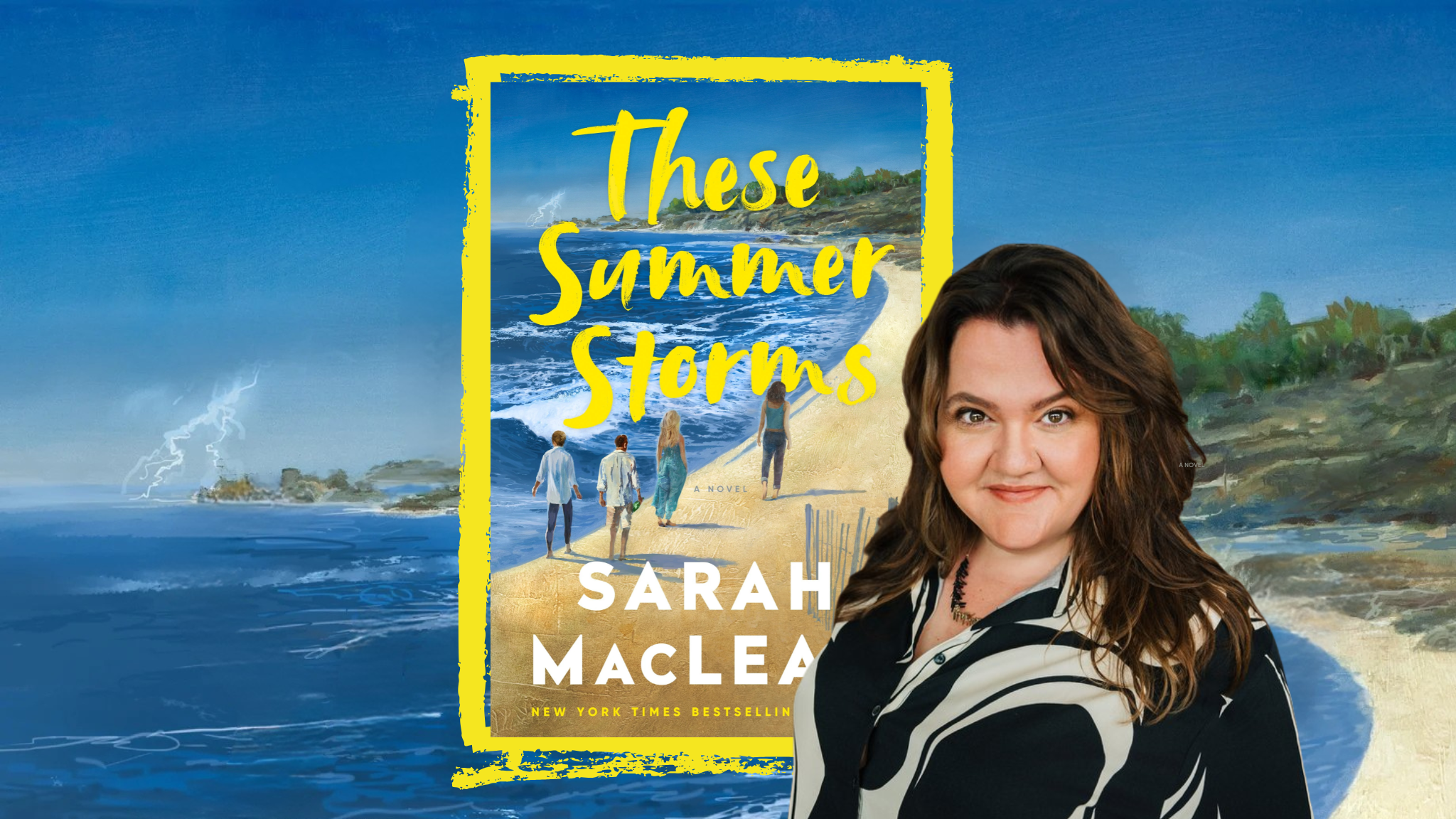These Summer Storms by Sarah Maclean
Historical romance author Sarah MacLean was nearly 90,000 words into writing her most recent manuscript when she called her agent in a panic. “I think I’m not writing a romance,” she said. Her agent replied, “Oh, thank God. We were all wondering when you were going to figure it out.”
In her debut literary novel, These Summer Storms, MacLean introduces us to a family who is at once wholly unique and achingly familiar. Their stunning wealth as owners of a high-tech business empire reflects our cultural moment even as their jealousy, affection, camaraderie and petty bickering resonate with anyone who has ever experienced the love-hate of a sibling relationship.
Switching to literary fiction took some bravery. Romance writing in general, and historical romance in particular, is a highly delineated world. You have your “beats” that tell when certain plot developments are meant to happen: when your clueless lovers suddenly figure out why they’re having stomach pains, when they do something about it, and when their love and commitment are put to the ultimate test. Literary fiction has no such structure. “Working without a net was really thrilling and really scary, but there’s that great proverb, leap and the net will appear,” says MacLean.
MacLean’s leap became These Summer Storms. She takes us to Storm Island, the private enclave in Narragansett Bay, Rhode Island, of the recently deceased tech billionaire Franklin Storm. The Storm siblings have been summoned home by their icy and imperious mother and include the ever-reliable eldest, Greta; Sam, the spoiled prince; Emily, the baby and family favorite; and rebellious Alice, once the heir apparent, now the estranged disgrace. Into this stew of grief, resentment, longing and jealousy, MacLean drops a ticking clock: the Storms must fulfill the requirements of a “game” within one week to receive their inheritance. Things are about to get juicy.
The siblings must navigate grief and loss, commands from their late father, the persistent pain of unanswered questions, and each other. “Siblings don’t just push your buttons,” MacLean says, “they install them. No one knows you like your siblings. That’s why they’re so fascinating. You’re forced to love them, but the loathing is embedded as well. There are no other relationships that behave in that way.”
MacLean’s inspiration to write Storms was the realization that we are archetypes the moment we are born, and within our families, that never really changes. “You come home and it doesn’t matter who you are out in the world; you’re still the person you were when you were 7 years old.” It’s as Ram Dass once said, “If you think you’re enlightened, go spend a week with your family.”
While Storms is every bit a contemporary novel, matriarch Elizabeth Storm would fit comfortably into a London ballroom in the Regency period. Her straitjacket of old New England money, power and patriarchy would be right at home among the Ton. Franklin, who we never meet on the page, is less delineated. It’s easy to shade him in colors built from our own experience with paternal figures. In fact, one of the joys of working in literary fiction for MacLean was the ability to leave Franklin open to interpretation, unlike romance, where motivations must be explained. “I get to not know and that’s OK,” she says.
MacLean is candid about the kind of hard work that is involved in writing a novel, but she makes Storms look effortless. She charges the Storm siblings with the bright energy of contemporary drama while invoking deliciously messy family epics by 20th-century authors like Judith Krantz and Danielle Steele. As in all of her novels, power plays a leading role — who has it, who wants it, who gets it and who deserves it.
She brings the island to life as a major character, with able assistance from the family home and an ancient tree shading the property. In her talented hands, these inanimate objects are not just metaphors, but entities with secrets of their own. There’s even a cameo from the past that appears in the third act that will delight MacLean fans. And of course, you can’t have a book named for storms without one showing up.
There’s a lot going on in These Summer Storms: lyrical descriptions, complex family dynamics, twisty plotting, literary metaphors and simmering sexual tension. MacLean confesses that it took a whole lot of Post-it notes to keep track of it all. “And because I’m Sarah MacLean and I get bored in any book without a romance, there has to be a romance.” In fact, there’s more than one.
MacLean pulls it all together in a crispy mille-feuille of a novel with a gin and tonic chaser and a happy sprinkling of Easter eggs. The results are delectable. Every time you shatter another layer as you bite in, there’s another one awaiting you.
“I hope this book will feel very personal to readers. I hope each person will find their own path through the storm,” she says.
About Sarah Maclean:
 New York Times, Washington Post & USA Today bestseller Sarah MacLean wrote her first novel on a dare and never looked back. Translated into more than twenty-five languages, the books that make up “The MacLeaniverse” are beloved by readers worldwide.
New York Times, Washington Post & USA Today bestseller Sarah MacLean wrote her first novel on a dare and never looked back. Translated into more than twenty-five languages, the books that make up “The MacLeaniverse” are beloved by readers worldwide.
In addition to her novels, Sarah is a leading advocate for the romance genre, speaking widely on its place as a feminist text and a cultural bellwether. A former columnist for the New York Times, the Washington Post and Bustle, she is a founding board member of Authors Against Book Bans and the co-host of the weekly romance podcast, Fated Mates.
A product of Rhode Island summers and New England Storms, Sarah now lives in New York City.





